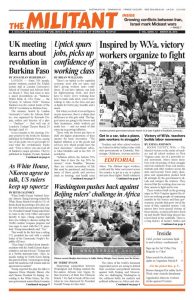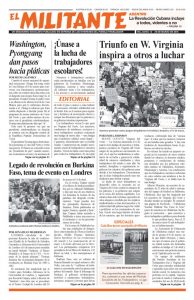NEW YORK — “Thomas Sankara spoke for the oppressed and exploited, and against the imperialist world order, which he showed can be fought and explained must be replaced,” Socialist Workers Party speaker Peter Thierjung told some 40 participants at a March 3 Militant Labor Forum here. “Thomas Sankara and the Political Awakening of Working People in the U.S. and Africa” was the title.
In recent months, Thierjung said, massive protests against government repression, corruption, for democratic rights, and for relief from the economic and social devastation wracking the African continent have taken place in Chad, Togo, the Congo, Zimbabwe, Niger, Mali, Nigeria, Gabon, Cameroon and Ethiopia.
“And in the U.S. discontent among working people has also been deepening. Like toilers in Africa, millions here are searching for answers and alternatives to a capitalist world order they don’t yet fully understand,” he said. The forum was held as West Virginia teachers were waging their successful strike.
“Sankara and the Burkina Faso Revolution stand as examples of what is possible, not only for Africa, but for working people the world over, including right here in the U.S.,” Thierjung said.
At the age of 33, Sankara led a popular uprising in the West African nation of Burkina Faso, one of the world’s poorest countries.
From meetings with farmers in Burkina Faso to speaking before the United Nations, Sankara denounced imperialist interference in the colonial world. He joined Fidel Castro to champion the fight to renounce the debt the imperialist rulers saddled the people of Africa and the rest of the semicolonial world with.
“Sankara stands out because he was a communist,” Thierjung said. “He didn’t reject Marxism as European ideas. He drew on the lessons of previous revolutionary struggles, including the American, French and the 1917 Russian revolutions, and the Cuba Revolution.”
The SWP responded to the Burkinabè Revolution by sending reporting teams to the country and campaigning with articles in the Militant that told the truth about the unfolding revolution. “We printed Sankara’s speeches for all to read,” he said.
On Oct. 15, 1987, Capt. Blaise Compaoré, a close associate of Sankara, carried out a military coup, murdering Sankara and 12 of his aides, destroying the revolutionary government from within. In 2014, Compaoré was driven from power by a popular uprising after 27 years of dictatorial rule. “The question posed today is what course forward now for the toilers,” Thierjung said.
“Since Sankara’s murder, the SWP has fought to prevent his enemies from burying his example and the lessons of the revolution,” Thierjung said. Pathfinder Press rapidly published Thomas Sankara Speaks to get his speeches and interviews in print. Hundreds attended meetings to launch the book in New York; London; Stockholm; Montreal; Toronto; Lyon, France; Sydney; and Auckland, New Zealand.
Thomas Sankara Parle, a French edition, has since been published, along with Women’s Liberation and the African Freedom Struggle and We Are Heirs of the World’s Revolutions, in French, English, Spanish and Farsi. They’re among Pathfinder’s most popular titles.
The books contain speeches like “Building a New Society, Rid of Social Injustice and Imperialist Domination”; “The Revolution Cannot Triumph Without the Emancipation of Women”; and “Our Struggle Draws Strength from Cuba’s Example and Support.”
“When African workers here — and there are tens of thousands in the U.S. today — see the books with Sankara’s picture on the cover, they say things like ‘That’s my man, that’s my president,’” Thierjung said. He described a recent discussion with a New York cab driver from Mali who drove him to the new movie “Burkinabè Rising.” He was excited to know about workers in the U.S. who promote books by Sankara. He bought We Are Heirs of the World’s Revolutions and kicked in a $5 contribution.
“A revolution is being prepared in the U.S. by the deep-going crisis of the capitalist system,” Thierjung said. “The SWP aims to help prepare the working class for what is coming. Reading and studying Thomas Sankara, along with books by Fidel Castro, V.I. Lenin, Malcolm X and leaders of the Socialist Workers Party is important to charting a course forward.”
“Thomas Sankara stands out from other African leaders. The course he charted was an example for working people, not only in Burkina Faso and Africa, but everywhere in the world,” Mary-Alice Waters, a leader of the Socialist Workers Party and author of the preface to Thomas Sankara Speaks, said in the discussion. “Every revolutionary struggle has its own conditions and history. But no revolution triumphs without battles through which working people develop confidence and pride in ourselves. Battles through which we transform ourselves. And that’s the course of struggle Sankara led.”
Sankara’s books — and many more on lessons on past revolutionary struggles and key political questions facing working people today — are available from SWP branches listed on page 8 or at www.pathfinderpress.com.

